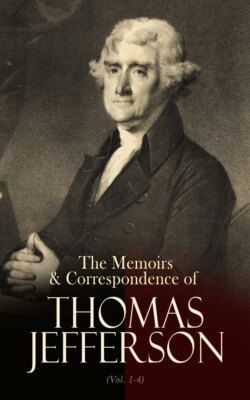Читать книгу The Memoirs & Correspondence of Thomas Jefferson (Vol. 1-4) - Thomas Jefferson - Страница 168
На сайте Литреса книга снята с продажи.
LETTER CXLVIII.—TO GENERAL WASHINGTON, January 4, 1786
ОглавлениеTable of Contents
TO GENERAL WASHINGTON.
Paris, January 4, 1786.
Dear Sir,
I have been honored with your letter of September the 26th, which was delivered me by Mr. Houdon, who is safely returned. He has brought with him the mould of the face only, having left the other parts of his work with his workmen to come by some other conveyance. Doctor Franklin, who was joined with me in the superintendence of this just monument, having left us before what is called the costume of the statue was decided on, I cannot so well satisfy myself, and I am persuaded I should not so well satisfy the world, as by consulting your own wish or inclination as to this article. Permit me, therefore, to ask you whether there is any particular dress, or any particular attitude, which you would rather wish to be adopted. I shall take a singular pleasure in having your own idea executed, if you will be so good as to make it known to me.
I thank you for the trouble you have taken in answering my inquiries on the subject of Bushnel’s machine. Colonel Humphreys could only give me a general idea of it from the effects proposed, rather than the means contrived to produce them.
I sincerely rejoice that three such works as the opening the Potomac and James rivers, and a canal from the Dismal Swamp are likely to be carried through. There is still a fourth, however, which I had the honor I believe of mentioning to you in a letter of March the 15th, 1784, from Annapolis. It is the cutting a canal which shall unite the heads of the Cayahoga and Beaver Creek. The utility of this, and even the necessity of it, if we mean to aim at the trade of the lakes, will be palpable to you. The only question is its practicability. The best information I could get as to this was from General Hand, who described the country as champain, and these waters as heading in lagoons, which would be easily united. Maryland and Pennsylvania are both interested to concur with us in this work. The institutions you propose to establish by the shares in the Potomac and James river companies, given you by the Assembly, and the particular objects of those institutions, are most worthy. It occurs to me, however, that if the bill ‘for the more general diffusion of knowledge,’ which is in the revisal, should be passed, it would supersede the use and obscure the existence of the charity schools you have thought of. I suppose in fact, that that bill or some other like it will be passed. I never saw one received with more enthusiasm than that was in the year 1778, by the House of Delegates, who ordered it to be printed. And it seemed afterwards, that nothing but the extreme distress of our resources prevented its being carried into execution even during the war. It is an axiom in my mind, that our liberty can never be safe but in the hands of the people themselves, and that too of the people with a certain degree of instruction. This it is the business of the State to effect, and on a general plan. Should you see a probability of this, however, you can never be at a loss for worthy objects of this donation. Even the remitting that proportion of the toll on all articles transported, would present itself under many favorable considerations, and it would in effect be to make the State do in a certain proportion what they ought to have done wholly: for I think they should clear all the rivers, and lay them open and free to all. However, you are infinitely the best judge, how the most good may be effected with these shares.
All is quiet here. There are indeed two specks in the horizon: the exchange of Bavaria, and the demarcation between the Emperor and Turks. We may add as a third, the interference by the King of Prussia in the domestic disputes of the Dutch. Great Britain, it is said, begins to look towards us with a little more good humor. But how true this may be, I cannot say with certainty. We are trying to render her commerce as little necessary to us as possible, by finding other markets for our produce. A most favorable reduction of duties on whale-oil has taken place here, which will give us a vent for that article, paying a duty of a guinea and a half a ton only.
I have the honor to be, with the highest esteem and respect, Dear Sir,
your most obedient and
most humble servant,
Tm: Jefferson.
